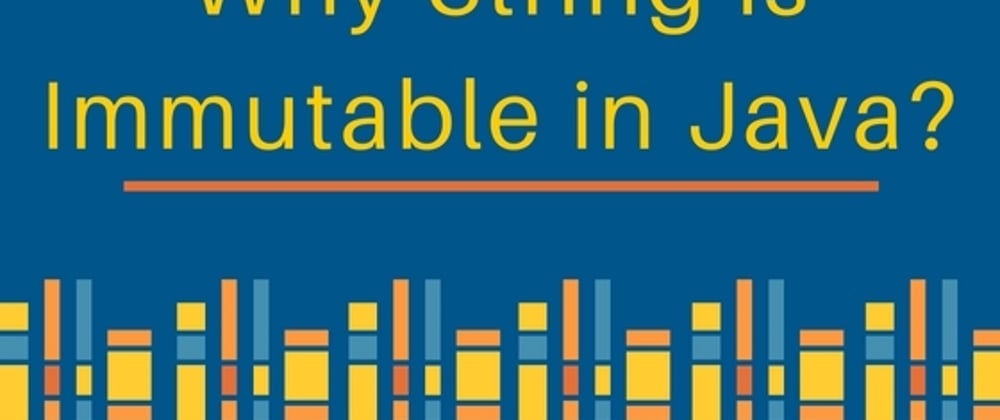Why Are Strings Immutable in Java? Key Factors and Benefits Clarified
Wiki Article
What Is Unalterable Strings and Just How It Works
In the world of programming, recognizing the idea of immutable strings is vital for creating safe and robust applications. Immutable strings refer to strings that can not be modified after they are created, guaranteeing data integrity and predictability within the code.The Essentials of Unalterable Strings
Immutable strings, as a basic principle in programming, are character sequences that can not be changed as soon as they are produced. This implies that when a string is assigned a worth, that value can not be altered. In languages like Python and Java, strings are immutable items, leading to various implications in terms of memory management and information honesty.One of the key benefits of unalterable strings is that they give a complacency in information adjustment. Because the web content of an immutable string can not be modified, it guarantees that the initial information continues to be undamaged, reducing the danger of unintentional modifications throughout program execution (Why are strings immutable in Java?). This residential or commercial property likewise streamlines debugging procedures, as designers can trust that when a string is specified, its worth will not be unintentionally changed
Additionally, unalterable strings facilitate effective memory use. When a brand-new string is developed based upon an existing one, as opposed to changing the initial string, the new worth is kept separately. This method enhances performance by decreasing memory fragmentation and streamlining memory allocation procedures. On the whole, recognizing the fundamentals of unalterable strings is essential for grasping programming principles and enhancing code performance.
Benefits of Immutable Strings
Building upon the protection and efficiency advantages of immutable strings, their advantages expand to boosting code integrity and streamlining concurrent shows jobs. By being immutable, strings can not be changed after development, which eliminates the threat of unintentional changes in the information they save. This fundamental immutability makes sure that as soon as a string is produced, its worth continues to be consistent throughout the program's implementation, minimizing the possibilities of pests triggered by unanticipated alterations.Additionally, unalterable strings add to code integrity by making it simpler to reason regarding the state of a program. Since strings can not be transformed, designers can rely on that a string will certainly always hold the exact same worth, streamlining debugging and upkeep efforts. This predictability causes a lot more secure and reputable codebases.

Application in Shows Languages
Within numerous programming languages, the unification of immutable strings is an essential facet that impacts exactly how information is managed and adjusted within code frameworks. The application of immutable strings differs throughout different programs languages, with each language using its very own systems to support this principle.

In comparison, languages like C and C++ do not have built-in assistance for immutable strings. Designers in these languages must by hand implement immutability by imposing regulations within their code to avoid direct alterations to string items.
Ideal Practices for Dealing With Immutable Strings
When dealing with immutable strings in programs languages like Java and Python, adhering to best practices ensures reliable and safe and secure data adjustment. Among the vital ideal methods is to utilize StringBuilder or StringBuffer as opposed to straight adjusting strings, particularly when handling comprehensive concatenation procedures. These courses give mutable choices for string control, assisting to avoid unneeded memory allocations and enhancing efficiency.Another best technique is to use string interpolation or format operates given by the language instead of manual concatenation. This not only boosts readability yet likewise aids in avoiding common pitfalls such as unintended string alterations. Additionally, when working with sensitive information such as passwords or API keys, it is crucial to prevent keeping them as plain text in immutable strings. Making use of safe and secure storage systems like char selections or specialized libraries for taking care of delicate info assists minimize safety threats associated with immutable strings.
Real-world Applications and Examples
Discovering practical implementations of unalterable review strings in different industries reveals their significant impact on information stability and system reliability. In the health care sector, immutable strings play an essential duty in making sure the protection and discretion of client data. By protecting against unapproved alterations to delicate info such as medical documents and prescriptions, unalterable strings aid keep conformity with stringent privacy guidelines like HIPAA.Financial establishments also take advantage of pop over to this site the unalterable nature of strings to enhance the safety of customer information and transaction records. Immutable strings help prevent scams and unauthorized modifications to economic details, offering a robust defense against cyber dangers and making sure the trust fund and confidence of clients.

Final Thought
Best practices for working with immutable strings consist of avoiding straight modifications and utilizing approaches that return brand-new string things. Real-world applications of unalterable strings consist of information encryption, caching, and string control tasks.Immutable strings refer to strings that can not be modified after they are developed, making sure data stability and predictability within the code. When a brand-new string is created based on an existing one, rather than changing the original string, the new value is stored individually.In languages like Java and Python, strings are unalterable by default, indicating that as soon as a string things is produced, its value can not be altered - Why are strings immutable in Java?. Finest techniques for functioning with unalterable strings consist of preventing straight alterations and utilizing approaches that return brand-new string things. Real-world applications of unalterable strings consist of data encryption, caching, and string control tasks
Report this wiki page